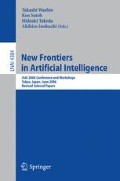Abstract
In this paper, we generalize previous results showing connections between inductive inference from positive data and algebraic structures by using tools from universal algebra. In particular, we investigate the inferability from positive data of language classes defined by closure operators. We show that some important properties of language classes used in inductive inference correspond closely to commonly used properties of closed set systems. We also investigate the inferability of algebraic closed set systems, and show that these types of systems are inferable from positive data if and only if they contain no infinite ascending chain of closed sets. This generalizes previous results concerning the inferability of various algebraic classes such as the class of ideals of a ring. We also show the relationship with algebraic closed set systems and approximate identifiability as introduced by Kobayashi and Yokomori [11]. We propose that closure operators offer a unifying framework for various approaches to inductive inference from positive data.
Access this chapter
Tax calculation will be finalised at checkout
Purchases are for personal use only
Preview
Unable to display preview. Download preview PDF.
References
Angluin, D.: Inductive Inference of Formal Languages from Positive Data. Information and Control 45, 117–135 (1980)
Angluin, D.: Inference of Reversible Languages. Journal of the ACM 29, 741–765 (1982)
Arikawa, S., Miyano, S., Shinohara, A., Shinohara, T., Yamamoto, A.: Algorithmic Learning Theory with Elementary Formal Systems. IECE Trans. Inf. & Syst. vol. E75-D 4, 405–414 (1992)
Birkhoff, G.: Lattice Theory, 3rd edn. American Mathematical Society (1967)
Burris, S., Sankappanavar, H.P.: A Course in Universal Algebra. Springer, Heidelberg (1981)
Cohn, P.M.: Universal Algebra. Harper & Row, New York (1965)
de Brecht, M., Yamamoto, A.: Mind Change Complexity of Inferring Unbounded Unions of Pattern Languages From Positive Data. In: Balcázar, J.L., Long, P.M., Stephan, F. (eds.) ALT 2006. LNCS (LNAI), vol. 4264, pp. 124–138. Springer, Heidelberg (2006)
Gold, E.M.: Language Identification in the Limit. Information and Control 10, 447–474 (1967)
Jain, S., Osherson, D., Royer, J., Sharma, A.: Systems that Learn: An Introduction to Learning Theory, 2nd edn. MIT Press, Cambridge (1999)
Kobayashi, M., Tokunaga, H., Yamamoto, A.: Ideals of Polynomial Rings and Learning from Positive Data (in Japanese). In: Proceedings of the 8th Workshop on Information-Based Induction Science, pp. 129–134 (2005)
Kobayashi, S., Yokomori, T.: On approximately identifying concept classes in the limit. In: Zeugmann, T., Shinohara, T., Jantke, K.P. (eds.) ALT 1995. LNCS, vol. 997, pp. 298–312. Springer, Heidelberg (1995)
Kobayashi, S.: Approximate Identification, Finite Elasticity and Lattice Structure of Hypothesis Space. Technical Report, CSIM 96-04, Dept. of Compt. Sci. and Inform. Math., Univ. of Electro- Communications (1996)
Motoki, T., Shinohara, T., Wright, K.: The Correct Definition of Finite Elasticity: Corrigendum to Identification of Unions. In: Proceedings of COLT ’91, p. 375 (1991)
Shinohara, T.: Inductive Inference of Monotonic Formal Systems From Positive Data. New Generation Computing 8, 371–384 (1991)
Shinohara, T., Arimura, H.: Inductive Inference of Unbounded Unions of Pattern Languages From Positive Data. Theoretical Computer Science 241, 191–209 (2000)
Stephan, F., Ventsov, Y.: Learning Algebraic Structures from Text. Theoretical Computer Science 268, 221–273 (2001)
Wright, K.: Identification of Unions of Languages Drawn from an Identifiable Class. In: Proceedings of COLT ’89, pp. 328–333 (1989)
Author information
Authors and Affiliations
Editor information
Rights and permissions
Copyright information
© 2007 Springer Berlin Heidelberg
About this paper
Cite this paper
de Brecht, M., Kobayashi, M., Tokunaga, H., Yamamoto, A. (2007). Inferability of Closed Set Systems from Positive Data. In: Washio, T., Satoh, K., Takeda, H., Inokuchi, A. (eds) New Frontiers in Artificial Intelligence. JSAI 2006. Lecture Notes in Computer Science(), vol 4384. Springer, Berlin, Heidelberg. https://doi.org/10.1007/978-3-540-69902-6_23
Download citation
DOI: https://doi.org/10.1007/978-3-540-69902-6_23
Published:
Publisher Name: Springer, Berlin, Heidelberg
Print ISBN: 978-3-540-69901-9
Online ISBN: 978-3-540-69902-6
eBook Packages: Computer ScienceComputer Science (R0)

